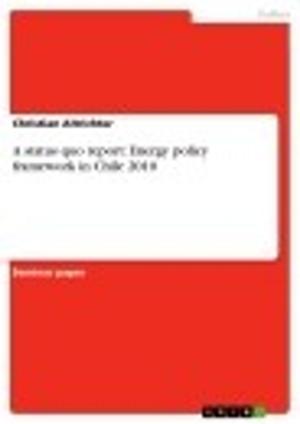Are authoritarian states more able to resort to the use of violence than democracies to fulfill their foreign policy aims?
Nonfiction, Social & Cultural Studies, Political Science, International, International Security| Author: | Peter Tilman Schuessler | ISBN: | 9783638157483 |
| Publisher: | GRIN Publishing | Publication: | December 3, 2002 |
| Imprint: | GRIN Publishing | Language: | English |
| Author: | Peter Tilman Schuessler |
| ISBN: | 9783638157483 |
| Publisher: | GRIN Publishing |
| Publication: | December 3, 2002 |
| Imprint: | GRIN Publishing |
| Language: | English |
Essay from the year 2002 in the subject Politics - International Politics - Topic: Peace and Conflict Studies, Security, grade: 17 von 20 (A), University of St Andrews (Department of IR), course: IR 1006, 23 entries in the bibliography, language: English, abstract: To begin it is necessary to clarify the title of this essay. As the question treats foreign policy aims, violence in this context is to be seen as the use of coercive means outside the own state's territory. This essay will furthermore not differentiate between the different authoritarian states and hence will include all non-democracies in this context. It will be therefore deal only with the capability and not with the probability of states to use violence. The democratic structure and culture in general makes it harder for the elected governments to act violently but this paper will illustrate that dictatorships will also face some constraints. It will be shown in particular that it is more difficult for democracies to initiate aggressive military operations openly than for authoritarian states, but that there are few differences in the ability to respond to provocations or hostile actions. There are even less distinctions between both kinds of rule in certain 'types of violence' like the deployment of covert actions To demonstrate those contrarieties and similarities this text will deal firstly with implications of structure, public opinion, alliances, economy, etc. on the visible use of force and secondly compare the systems in regard to hidden operations. Hence there are so many different kinds of states that it is not possible to find suitable abstract descriptions of their capabilities. This essay will try to clarify the argument with some examples, well aware that they do not fit for all democratic and all authoritarian states.
Essay from the year 2002 in the subject Politics - International Politics - Topic: Peace and Conflict Studies, Security, grade: 17 von 20 (A), University of St Andrews (Department of IR), course: IR 1006, 23 entries in the bibliography, language: English, abstract: To begin it is necessary to clarify the title of this essay. As the question treats foreign policy aims, violence in this context is to be seen as the use of coercive means outside the own state's territory. This essay will furthermore not differentiate between the different authoritarian states and hence will include all non-democracies in this context. It will be therefore deal only with the capability and not with the probability of states to use violence. The democratic structure and culture in general makes it harder for the elected governments to act violently but this paper will illustrate that dictatorships will also face some constraints. It will be shown in particular that it is more difficult for democracies to initiate aggressive military operations openly than for authoritarian states, but that there are few differences in the ability to respond to provocations or hostile actions. There are even less distinctions between both kinds of rule in certain 'types of violence' like the deployment of covert actions To demonstrate those contrarieties and similarities this text will deal firstly with implications of structure, public opinion, alliances, economy, etc. on the visible use of force and secondly compare the systems in regard to hidden operations. Hence there are so many different kinds of states that it is not possible to find suitable abstract descriptions of their capabilities. This essay will try to clarify the argument with some examples, well aware that they do not fit for all democratic and all authoritarian states.















